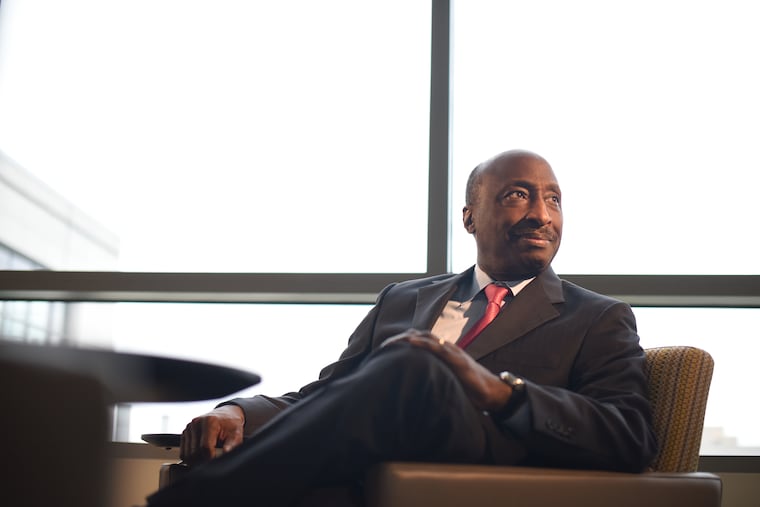Merck CEO Kenneth Frazier: ‘It’s a mistake for corporations to take democracy for granted’
Delivering keynote remarks at the Invent Penn State Venture & IP conference, he urged his audience to take a stand for the things that fundamentally underscore our democracy.

Over the last several weeks, Merck & Co. CEO Kenneth Frazier has led efforts to organize hundreds of major corporations and business executives to publicly oppose restrictions on voting rights, as Republican lawmakers in many states consider or enact changes to voting rules following former President Donald Trump’s 2020 loss.
On Friday, while delivering keynote remarks at the Invent Penn State Venture & IP conference, Frazier expanded on that message, warning that “it’s a mistake for corporations to take democracy for granted,” since their long-term business interests depend on a stable society.
“I would use Jan. 6 and the Capitol insurrection as an example,” Frazier said. “I think we have to realize that if we do not take a stand for tolerance, reasonableness, and for the things that fundamentally underscore our democracy, we can lose the situation that we’ve had forever: peaceful transfer of power, rule of law, and all those things that business depends on.”
Frazier, a Penn State alum who grew up in North Philadelphia, has served as chief executive of the Kenilworth, N.J., drugmaker since 2011. He is set to retire June 30, and is currently one of only four Black CEOs at a Fortune 500 company.
His exit comes as Merck embarks on plans to help manufacture Johnson & Johnson’s coronavirus vaccine at Merck’s own facilities. Frazier had also previously announced, last December, his role as co-chair of OneTen, a jobs initiative aimed at training and hiring one million Black Americans over the next decade.
His comments Friday touched on that initiative, saying that companies can create a “structural barrier” to hiring African Americans by requiring credentials — like a four-year college degree — rather than focusing on skill sets.
“What you’ll find often is, for African Americans, the normal sequence of getting a college degree and then getting a good job is reversed,” Frazier said. “Often people get their first job and then take advantage of the educational opportunities inside companies.”
More broadly, Frazier referred to what he views as an “opportunity gap” for Black and Latino students that starts in school, and an “access gap” that follows them to the workplace.
Reflecting on his own experience of “being bused to a good school — that closed the opportunity gap for me,” Frazier said. “But the reason I’m a CEO is because I had access to Roy Vagelos,” the chief executive of Merck when Frazier joined the company in 1992 as an in-house attorney. Frazier worked closely with Vagelos, and credits him with providing “opportunities to grow outside my legal background.”
“That access to the people who can make or break your careers, and who can teach you through their actions how to do these senior level jobs, those are so important,” Frazier said.
Recently, he said, Merck has asked its leaders to commit to acting as “allies, and sponsors, and mentors” for Black and Latino colleagues.
Frazier’s final months as CEO are now coinciding with legislative efforts around the country to revise how voters can access the ballot, after Trump’s baseless claims that he lost the 2020 election because of widespread voter fraud.
“We raise the specter of voter fraud, and now we restrict legal voters, eligible voters’ ability to cast ballots,” Frazier told CNBC last month, after Georgia enacted new voting legislation.
Georgia, which flipped from red to blue last November and elected two Democratic U.S. senators in the January runoff, became the first state last month to adopt more restrictive measures after the presidential contest. Lawmakers in other states have introduced hundreds of bills to reduce ballot access. In Pennsylvania — which helped deliver victory to Joe Biden — lawmakers in the GOP-controlled legislature are also considering an election overhaul.
The changes to voting in Georgia “made it harder for people who live in the most populous areas, largely nonwhite voters, to vote,” Frazier said in a March 31 interview on CNBC. He cited new reductions in the number of secure drop boxes for collecting ballots, a much-shortened window for requesting mail-in ballots, and a ban on handing out water to voters in line — on top of already-long waits for Black voters at some polling locations, he said.
Frazier felt strongly that the Georgia law “could be a prototype for a lot of bad laws,” he told CNBC.
Frazier and Kenneth Chenault, the former CEO of American Express, began urging corporate leaders to oppose “discriminatory” voting legislation once the Georgia law was adopted. The two businessmen, along with dozens of Black executives, signed an open statement to that effect March 31, linking new barriers to the country’s history of denying voting rights to African Americans.
This week, Frazier and Chenault helped organize another published statement, with signatures from hundreds of major corporations, business leaders, and law firms.
Frazier on Friday said it’s not for CEOs to “take positions on every political issue.”
“But there every once in a while arise issues that I think go to the core of what our democracy is about,” he said.